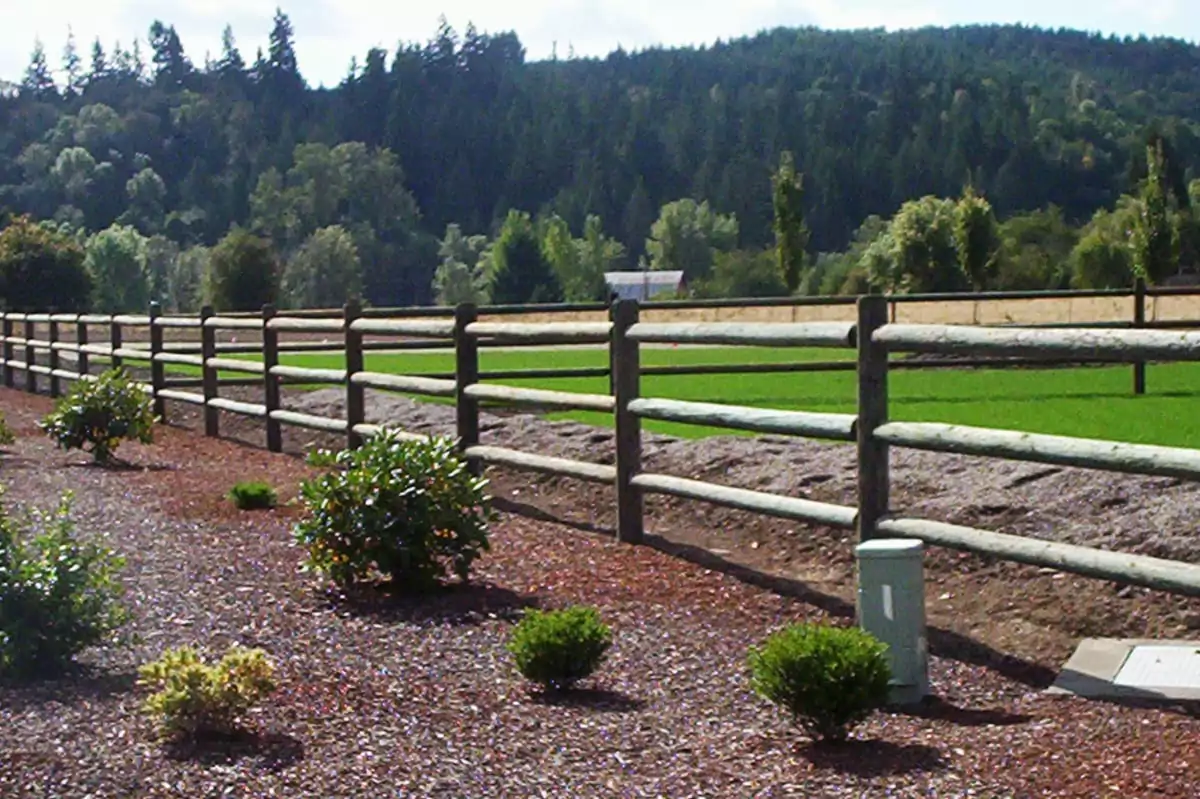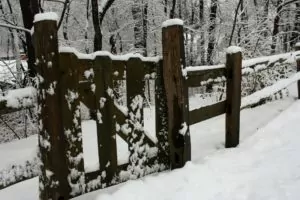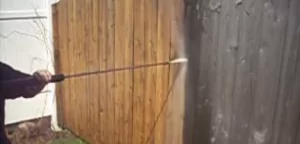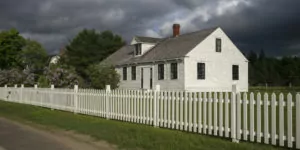Once you get away from the city a little bit, you can tell almost instantly when you’ve crossed over from urban to rural. Larger homes, more land, and almost all of the cedar slat or chain link fencing have been replaced by split rail, crossbuck, and other distinctive farm fence ideas.
Farm fences come in a range of designs, materials, and uses. They can be used to contain animals, keep predators at bay, or simply enhance the look of your property. Privacy fences aren’t as necessary out here because your closest neighbor could be miles away!
Farm Fence Ideas
While privacy may not be a primary concern, farm fencing does have a job to do on a farm or ranch: keeping livestock in place. If you’re starting a hobby farm, want to establish property lines, or just want to replicate that look, here area few farm fencing options for your consideration:
- Split Rail
- Round Rail
- Post and Rail
- Crossbuck
- Wire Fencing
Split Rail Fence
A traditional style and one of the oldest types of fencing. Back in the day, these were made from split logs that were stacked across each other, usually in a zigzag pattern. Today, they have either two or three rails with posts between them to secure them in place. This type of fence provides charm and rustic appeal, making it perfect for properties in rural settings.
Round Rail Fence
This is another popular option for farm fences and is similar to the split rail in that the ends of the rails are tapered down and fit into holes in the post. These fences are constructed using round wooden posts, usually with two or three rails interlocked within the post holes. Round rail fences provide an elegant look and can be painted any color to match any landscape.
Post and Rail Fencing
Vertical posts are set at regular intervals with two or three rails between them–they essentially look like residential fencing without the vertical slats. This fencing is commonly used around horse paddocks and pastures as it is strong enough to contain animals without the risk of injury. It can also be painted for visual appeal, making it a great option for a decorative farm fence.
Crossbuck Fence
Similar to post and rail fencing, except the rails are crossed to form a giant “X” between the fence posts. A top and bottom horizontal rail may be used to close large openings. This type of fencing provides strength and stability while still allowing visibility through the gaps in the crossed boards. It’s often seen in rural settings, adding a unique touch to any landscape.
Wire Fencing
These are similar to chain link or cyclone fencing in residential use. Posts or stakes are put into place and different types of wire fencing are strung up between them. Depending on the livestock (chicken wire will need less brawn than wire for larger animals), the size of the posts and wiring will fluctuate.
Farm Fence Ideas: Materials
What says “entering ranch country” more than rustic-looking wood fencing? But if you’re wondering about farm fencing ideas, there are several types of materials to consider:
- Wooden Fences
- Vinyl Fences
- Woven Wire
- Welded Wire
- Barbed Wire Fences
- Electric Fences
- Chain Link Fences
- Hedge Fences
Wooden Fences
If you’re looking for an aesthetically pleasing option that will still hold up to a variety of conditions, a wood farm fence is an ideal material. Wooden boards can be nailed together in various patterns and sizes to create a custom look that is also strong and functional. Plus, you can use treated wood to extend the life and easily repaint or stain the boards to fit with the changing seasons if desired.
Vinyl Fences
Vinyl is a popular material for farm fencing due to its low maintenance and durability. It can also be designed with a variety of colors and styles, making it perfect for customizing to your unique needs. Vinyl is also more cost-effective than wood over time since you won’t need to worry about regular painting or staining upkeep.
Woven Wire Fence
Woven wire mesh fences are great for containing horses and other livestock, as well as providing protection from predators. They are usually constructed using galvanized steel wires woven together at various heights and lengths. The horizontal wires should be spaced closely enough that animals can’t escape through them, while the vertical wires provide reinforcement against pressure from animals pushing on them.
Welded Wire
These fences are made of galvanized steel high tensile wire welded together in a grid pattern. If the fence requires something for larger livestock, the wires can be spaced farther apart. Welded-wire fences come in a variety of heights and lengths, making them an ideal solution for any farm or ranch that needs to contain livestock. These fences don’t have as much give as woven wire.
Barbed Wire Fences
Barbed wire fences are highly effective for containing animals, as they make it difficult to escape or intruders to enter. The sharp, metal points are typically woven between steel posts and can be used in combination with other types of fences for even more security.
Electric Fences
For those looking for a containment option that is both easy to maintain and highly effective, electric fencing is a great choice. Electric fencing works by sending an electric shock through the wires when an animal touches them. This makes it ideal for keeping animals in place without the need to constantly monitor them.
Chain Link Fences
Chain link fences are an affordable option for containing large amounts of animals. They can be constructed with galvanized steel or coated steel posts. This type of fencing is also quite durable and easy to maintain, making it ideal for farms that need long-term containment solutions.
By considering these farm fence ideas, you’ll be sure to find one that meets your unique needs and budget. Make sure you also consider the environment around your property so you can choose a material and design that will work best in your area. With the right fence, you’ll have peace of mind knowing your animals are safe and secure!
No matter what your farm fencing choice is, be sure to take into consideration its purpose, usage frequency, climate conditions, and budget before making a decision. With careful selection and a plan in place, you’ll have a fence that lasts for many years! Even if it’s a small easy-to-install picket fence around a flower bed, planning is a key component of any farm fence idea.





